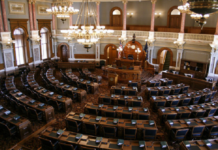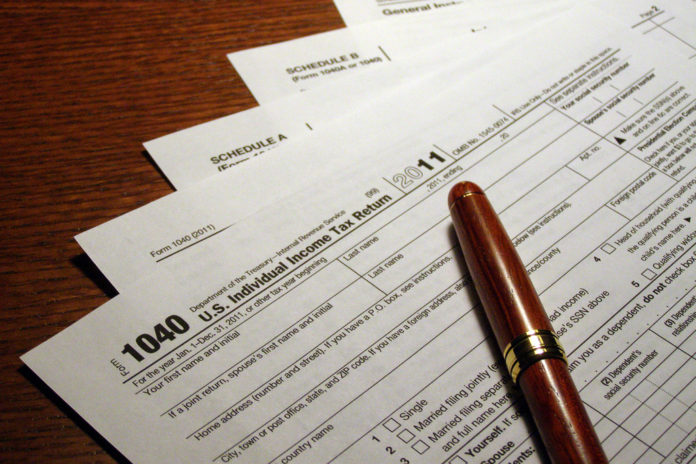(UPDATED to reflect final vote, but may be revised further as warranted)
The Kansas House on Wednesday unanimously approved a new dual-rate income tax plan that would cut property taxes and eliminate the income tax on Social Security in favor of a single-rate structure that was adamantly opposed by Gov. Laura Kelly.
The House vote came less than 24 hours after Democrats and Republicans agreed on a tax plan that emerged after GOP leadership on that side of the rotunda acknowledged it would have trouble finding votes to overcome the governor’s veto.
Whether the governor will buy into the new plan still seems in doubt.
“While this tax package is a step forward in finding compromise on meaningful, sustainable tax relief, the overall fiscal cost risks putting the state in a precarious financial situation in the out years,” said Will Lawrence, the governor’s chief of staff.
“Kansans also want tax relief in the form of the child care tax credit, which needs to be included in any final package,” Lawrence said in a statement.
Some House Republicans offered lukewarm support for the plan, saying they still would have preferred a single-rate plan.
“We could have, and should have, passed a single rate tax plan that lowered every Kansans taxes and been harder to raise in the future,” said Republican state Rep. Susan Humphries of Wichita, who was joined her statement by more than dozen GOP legislators.
“For smaller government, growth-oriented conservatives, let’s continue to work together toward a path to economic growth that would send a signal to retirees, businesses, and investors that Kansas wants to compete,” she said.
“If this is the best we can do today, we’ll take it. We are on the right path,” she said.
The plan approved by the House is very different from the single-rate tax structure that the Senate approved, although it will be a little more expensive than it was originally proposed a week ago.
Vic Miller, the top Democrat in the House, suggested on Tuesday that this may be the tax plan that carries the day after lawmakers struggled to find the right balance of a tax plan that might get support from Gov. Laura Kelly.
“If this plan passes tomorrow, hang tight,” Miller told the chamber, adding he may vote “yes” because “there’s a lot of good things in it.”
“I think this may be what people out across the state have been looking for. Hang tight, if this goes to conference,” he said.
Democratic state Rep. Tom Sawyer, the ranking member on the House tax committee, spoke glowingly of the bill tentatively agreed to late Tuesday.
“This is good, broad-based tax relief,” Sawyer said.
“Everybody that pays income taxes will get income tax relief. Those in the middle come out pretty good. Everybody that pays property taxes will get property tax relief.
“Every senior in the state that pays Social Security (taxes) will get a big tax cut.
“This is broad-based tax cuts for people across the state of Kansas.”
The new tax bill calls for collapsing the state’s three-rate structure to two rates, the top two of which are currently at 5.7% and 5.25%.
It would eliminate the bottom rate of 3.1%.
The House plan would cut the top personal individual income tax to 5.65% and the smaller bracket to 5.2%.
The first $7,000 for a single filer’s tax rate would not be taxed. The first $14,000 for a married couple filing jointly also would not be taxed.
The plan would also increase the standard deduction across the board:
- Increasing to $3,605 from $3,500 for single filers.
- Increasing to $6,180 from $6,000 for head of household.
- And increasing to $8,240 from $8,000 for married couples filing jointly.
The standard deduction would be adjusted for inflation for two years. After two years, it would be up to the Legislature to renew the inflation adjustment.
It also would increase the personal income tax exemption to $2,320 from $2,250.
It, too, would adjust for inflation for two years before it would need to be renewed by the Legislature.
The bill also would lower the state’s 20-mill tax property tax levy for schools to 18 mills.
The money for schools would be replenished from the state general fund.
The House adopted a couple of key changes.
As first proposed, the House plan would have phased out taxes on Social Security income over four years. The House bill was amended so that is immediately ended.
The bill also was amended to eliminate the sales tax on food starting July 1. The original House bill did not touch the food sales tax.
The House also increased the amount of property exempt from the school property tax levy to $100,000 from the $80,000 that was in the original bill.
Republican state Rep. Adam Smith, chair of the House tax committee, shepherded the bill through the legislative waters.
Smith said the tax plan was focused on having the most impact on middle-class taxpayers while limiting the fiscal impact to less than about $500 million a year.
The tax plan that came out of committee last week largely did that, although it was still unclear how the changes in the bill would affect that goal.
Smith loosely estimated that with the new income tax brackets, a single filer earning $30,000 a year would save $65 and a single filer making $50,000 would save $75.
Meanwhile, a married couple earning $60,000 who filed jointly would save $125. A couple earning $100,000 would save $150, and a couple making $200,000 would save $200.
“I know it doesn’t sound like a whole lot, but in the overall scope of things if you’re wanting to provide broad tax relief, $100 million doesn’t go very far when you stretch it over a lot of people,” he said.
Smith had a statement read into the record joined by about two dozen lawmakers.
He called the new plan a “comprehensive tax relief proposal” that provides “sustainable tax relief to Kansas taxpayers.”
Kelly had indicated that she would only sign a tax bill that would be fiscally sustainable moving into the future, saying she didn’t want to return to former Gov. Sam Brownback’s tax cuts that were blamed for blowing holes in the budget.
Kelly had already vetoed two plans from the Legislature that would have moved the state to a single tax rate, saying it would have returned Kansas to the Brownback era.
She vowed to call the Legislature into a special session if lawmakers adjourned this year without passing a tax cut at a time when the state is holding more than $3 billion in reserve.
The House had been pushing for a single tax rate until Republican leadership decided it couldn’t override the governor’s veto and time was running short in this legislative session to pass a tax plan.
“I am probably the most steadfast person on wanting a single rate tax,” House Speaker Dan Hawkins told reporters last week.
“This whole year, we worked toward that direction,” he said. “But you can only do what you have votes for. And it became very evident that we’re not going to get to an override vote.”
Democratic state Rep. John Carmichael of Wichita praised Republicans and Democrats for being able to find a tax plan that might just work.
“Now we have to put aside the comparatively minor differences we had on this tax package, and we have to stand fast in the face of what may be attempts by our colleagues from across the rotunda,” Carmichael said.
“If we can make what we’ve done here tonight stick, we will have all earned our pay.”













